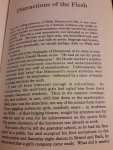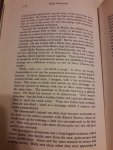-
Welcome to the Cricket Web forums, one of the biggest forums in the world dedicated to cricket.
You are currently viewing our boards as a guest which gives you limited access to view most discussions and access our other features. By joining our free community you will have access to post topics, respond to polls, upload content and access many other special features. Registration is fast, simple and absolutely free so please, join the Cricket Web community today!
If you have any problems with the registration process or your account login, please contact us.
Who is England's greatest cricketer?
- Thread starter Fuller Pilch
- Start date
TheJediBrah
Request Your Custom Title Now!
That's brilliant writing
Chubb
International Regular
It's supposed to be a great book. I've not read it but was aware what it says about Hammond's reputation hence my joke.That's brilliant writing
Foot's book about Harold Gimblett is also a masterpiece, by report. Two very sad figures in their own ways I think.
honestbharani
Whatever it takes!!!
Hammond was quite good
could have at least ended with "at it".

Daemon
Request Your Custom Title Now!
Meanwhile Rory Burns is taking a steaming dump on itHammond illustrated it.
TheJediBrah
Request Your Custom Title Now!
Stokes is using it as a bludgeon to assault minorities
Pap Finn Keighl
International Regular
Must be a misfit, He was not the best batsman of his time.Grace rewrote the coaching manual. Ranji expanded it. Hobbs refined it. Hutton perfected it.
Sounds like a compelling narrative. Somebody fit Hammond in there.
Pap Finn Keighl
International Regular
Must be a misfit, He was not the best batsman of his time.Grace rewrote the coaching manual. Ranji expanded it. Hobbs refined it. Hutton perfected it.
Sounds like a compelling narrative. Somebody fit Hammond in there.
Line and Length
International Coach
But he was the best all-rounder ... on and off the field.
h_hurricane
International Vice-Captain
In fact Pietersen full a**ed it with all those switch hits.Root half-assed it.
Lillian Thomson
Hall of Fame Member
Starfighter
Cricket Web: All-Time Legend
Dvorak 9 in the background lol.
Coronis
Hall of Fame Member
Quite unfortunate that his career almost completely overlapped with Bradman. Still a top 5 test bat of all time imo. (Until Smith finishes at least)Must be a misfit, He was not the best batsman of his time.
cricketsavant
U19 12th Man
There is no distinction between the two, when discussing greatness in sport. I am not sure why you would not understand that, it is very very simple. Now, if this discussion has a different definition, that is fine but please don't sit in your warped basement and tell me that in sport greatest doesn ot mean best. ThanksHow ironic to see someone calling themselves cricketsavant is naive enough not to understand the difference between greatest and best, and either dumb or arrogant enough not to accept it even after it has been clearly explained to them.

TheJediBrah
Request Your Custom Title Now!
I love this guy
a massive zebra
International Captain
Here is a description of W.G.'s fielding, taken from the biography by Robert Low:One surprising (and not particularly well-known) fact about WG is that if you rank all Test cricketers (excluding wicket-keepers) who played 10 or more Tests by "number of catches per innings", WG is in the top 10 (behind some noted fielders like Solkar, Constantine and Simpson, so it's not a completely random list). If he'd retired when he turned 45, he'd have been top (37 catches in 34 innings).
Robert Low said:It is rare for a great batsman not to be a fine fielder. The requirements are the same: a good eye and hands, quick feet, fast reflexes: W.G. had all these in abundance, and consequently was one of the best fielders and catchers of his time. There was a family tradition to keep up: E.M. was acknowledged to be the finest fielder in England, lurking with intent at point, which was also W.G.'s favourite position. Early in his career, while E.M. fielded at point, he would be stationed at mid-off or mid-on where his superb athleticism could be shown to good advantage. Then along came G.F, who was without doubt the best outfielder of his generation, a wonderful sight racing round the boundary to hold onto catches that no one else would have even got close to. When W.G. fielded at point, just as E.M. did, he gave the impression of snatching the ball off the face of the bat, so close did he crouch, the ball disappearing into those huge hands 'like a pea in a jar' as one contemporary put it. He took 875 first-class catches and countless others in club cricket.
W.G. had the priceless gifts for a fielder of stamina and concentration - and a keenness that no one could equal, even in his fifties, when his massive bulk made it difficult for him to bend down and reach the ball. But for thirty years he was as dominant in the field as with bat or ball. As a young man he was a magnificent thrower of a cricket ball. In a contest at Eastbourne he threw a ball 122 yards. On another occasion he threw it 109 yards in one direction and 105 the other way. As he aged, he preferred to bowl the ball in from the long field, recalled Lord Harris, who also remembered that he was always on the look out to catch a batsman out of his ground.
"You would see him occasionally face as if about to return the ball to the bowler, and instead send it underarm to the wicket-keeper, but I never saw him get anyone out that way."
He also loved to take the opportunity of keeping wicket and did so once in a Test match at The Oval in 1884. He was credited with five first-class stumpings. His enthusiasm caused the immortal remark to be made 'That fellow would like to keep wicket to his own bowling.'
Prince EWS
Global Moderator
This for me too. I could almost be persuaded for Hammond ahead of Hobbs, but not quite.Either Grace or Hobbs imo.
If the question is "greatest cricketer" there's no doubt it's Grace. If it's test cricket specific, it's Hobbs.
Voted for Grace because of how the question was phrased.
a massive zebra
International Captain
To look at W.G. Grace's dominance another way, these batsmen had scored over 5,000 runs in first class cricket at an average of over 20 by the end of the 1873 season:this is the one i remember, from @OverratedSanity
W.G. Grace 10,669 runs @ 61.51 with 38 centuries.
Harry Jupp 9,987 runs @ 24.53 with 8 centuries
William Beldham 7,043 runs @ 21.47 with 3 centuries
George Parr 6,626 runs @ 20.20 with 1 century
Richard Daft 6,427 runs @ 29.48 with 6 centuries
Lord Frederick Beauclerk 5,442 runs @ 24.96 with 5 centuries
Bob Carpenter 5,184 runs @ 24.80 with 4 centuries
flibbertyjibber
Request Your Custom Title Now!
In his own head it has to be Boycott.


